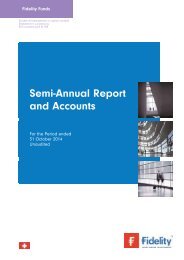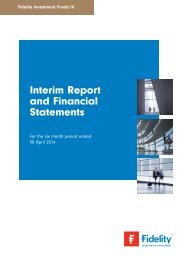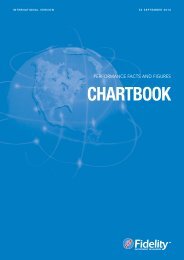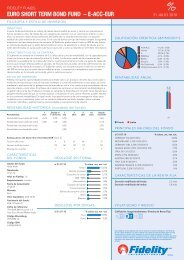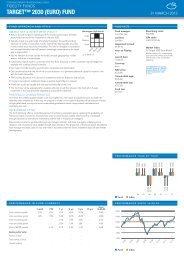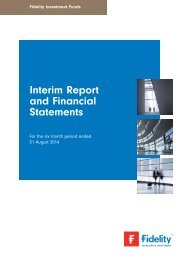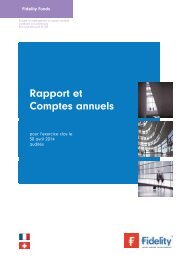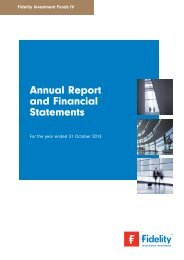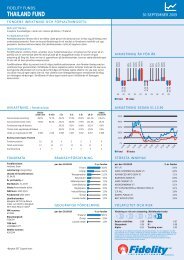Semi-Annual Report and Accounts - chartbook.fid-intl.com
Semi-Annual Report and Accounts - chartbook.fid-intl.com
Semi-Annual Report and Accounts - chartbook.fid-intl.com
You also want an ePaper? Increase the reach of your titles
YUMPU automatically turns print PDFs into web optimized ePapers that Google loves.
Fidelity<br />
Funds<br />
Investment Manager’s <strong>Report</strong>*<br />
Performance Overview - 6 months ended 31 October 2012<br />
Global equities rose over the six months ended 31 October 2012. Weak economic data <strong>and</strong> consequent concerns about global growth coupled with<br />
persistent speculation about Greece exiting the eurozone <strong>and</strong> anxiety about Spain’s banking system weighed on markets in the initial months. Equities,<br />
however, recovered after an agreement by eurozone leaders to relax conditions for recapitalising banks <strong>and</strong> central bank stimulus measures aimed<br />
at boosting money supply in order to support faltering growth. The European Central Bank (ECB) announced a new, conditional sovereign bond-buying<br />
programme <strong>and</strong> the US Federal Reserve (Fed) extended its “Operation Twist” where it sold short term securities to buy longer term debt to push down<br />
long term borrowing cost, <strong>and</strong> launched a third round of quantitative easing (QE3). Moreover, the Bank of Japan <strong>and</strong> Bank of Engl<strong>and</strong> (BoE) exp<strong>and</strong>ed<br />
their asset purchase programmes. Separately, Chinese authorities announced an infrastructure investment programme. Stock markets lost some ground<br />
towards the end of the period due to resurgence of concerns about global growth <strong>and</strong> <strong>com</strong>pany earnings. Uncertainty about the up<strong>com</strong>ing US<br />
Presidential election <strong>and</strong> impending fiscal cliff also kept investor sentiment subdued.<br />
Equities in Europe ex-UK rose the most in US Dollar terms over the period, closely followed by those in Pacific ex-Japan. The UK <strong>and</strong> the US rose by<br />
smaller margins whilst emerging markets <strong>and</strong> Japan declined over the period. At a sector level, health care, tele<strong>com</strong>munications <strong>and</strong> financials<br />
generated the best returns, outperforming the information technology <strong>and</strong> materials sectors. Returns in US Dollar terms were hurt by its appreciation<br />
against the Euro, Sterling <strong>and</strong> the Yen.<br />
110<br />
105<br />
100<br />
95<br />
90<br />
85<br />
Apr 12<br />
May 12<br />
Jun 12<br />
Jul 12<br />
Aug 12<br />
MSCI World Global Bonds<br />
Sep 12<br />
Oct 12<br />
MSCI EUROPE EX-UK<br />
MSCI PACIFIC EX-JAPAN<br />
Global Bonds<br />
MSCI UK<br />
MSCI World<br />
MSCI USA<br />
MSCI EM<br />
MSCI JAPAN<br />
Source: Datastream, Total Returns in USD rebased to 100, 30.04.2012 – 31.10.2012 Source: Datastream, Total Returns, USD, 30.04.2012 – 31.10.2012<br />
European equities advanced over the period, though stocks remained volatile. There were concerns about the spread of the debt crisis <strong>and</strong> the<br />
possibility of Greece exiting the eurozone. However, healthy corporate results <strong>and</strong> ac<strong>com</strong>modative policy actions by global policymakers provided<br />
support. ECB President Mario Draghi’s pledge to do “whatever it takes” to save the Euro also proved positive. Sentiment improved further after the<br />
ECB agreed to launch an unlimited bond purchase programme to lower borrowing costs for some indebted eurozone nations. As a result, financial<br />
stocks surged over the period. Overall, the health care <strong>and</strong> utilities sectors performed well, whilst consumer discretionary <strong>and</strong> tele<strong>com</strong>munication<br />
services lagged.<br />
The UK stock market rose mainly due to encouraging policy announcements by global central banks. The BoE increased its asset purchase facility to<br />
£375 billion. There was encouraging news on the economic front, as the UK emerged from recession over the third quarter of 2012, supported by the<br />
Olympic Games. Concerns about the eurozone credit crisis, which caused significant volatility in April <strong>and</strong> May, also subsided somewhat after<br />
authorities approved several policy measures to recapitalise banking systems in troubled countries. Financials, technology <strong>and</strong> consumer related firms<br />
were among the notable gainers during the period, whilst there was a rotation out of defensives. Returns from the resource sectors were weak due to<br />
growing concerns about dem<strong>and</strong>, especially from China.<br />
US equities gained following aggressive policy intervention at home <strong>and</strong> abroad. Lacklustre economic data <strong>and</strong> weak jobs growth early in the period<br />
prompted the Fed to launch an aggressive QE programme linked to a recovery in the jobs market. Continued consolidation in the housing sector <strong>and</strong><br />
policy interventions in Europe also supported sentiment. Nevertheless, the uncertainty surrounding the out<strong>com</strong>e of the US Presidential election<br />
restrained gains. On the corporate front, many businesses lowered their earnings expectations citing a weaker dem<strong>and</strong> outlook <strong>and</strong> corporate profits<br />
were expected to decline. Most businesses had sound balance sheets <strong>and</strong> remained cash rich. Valuations were cheap on a free cashflow basis <strong>and</strong><br />
fair on a price-to-earnings basis.<br />
After rallying strongly at the start of 2012, the Japanese market started to lose momentum by the second quarter. As developments overseas escalated,<br />
the rate of decline in Japan accelerated. Below consensus economic data in China <strong>and</strong> the US, <strong>and</strong> deteriorating conditions in the eurozone resulted<br />
in renewed risk aversion globally. Statements from monetary authorities raised expectations of coordinated easing <strong>and</strong> stocks recovered some ground.<br />
However, gains were short lived. Uncertainty about the outlook for global growth, particularly in China <strong>and</strong> Europe, contributed to a surge in the Yen.<br />
Improvements in US economic data provided a subsequent boost to sentiment, but Japanese stocks lacked direction. The latest wave of central bank<br />
stimulus measures lifted Japanese equities, though tensions with China <strong>and</strong> negative earnings revisions capped gains.<br />
Asia Pacific ex-Japan equities edged higher over a period that was characterised by fears over slowing growth in China. Cyclicals ended lower, whilst<br />
defensives advanced strongly. Consumer discretionary was the worst performing sector in US Dollar terms, driven by a slowdown in retail sales <strong>and</strong><br />
subdued consumer con<strong>fid</strong>ence in the developed world. Materials <strong>and</strong> energy shares also succumbed to flagging economic growth prospects. On the<br />
other h<strong>and</strong>, high yielding stocks within the tele<strong>com</strong>munications <strong>and</strong> utilities sectors surged. Financials also performed well, particularly following the<br />
announcement of liquidity enhancing measures by leading central banks around the world.<br />
Emerging market equities declined over the period. Stocks in the larger emerging economies, such as China, South Korea, Brazil <strong>and</strong> Taiwan, fell amid<br />
flight to safer assets <strong>and</strong> data releases from the US <strong>and</strong> China that suggested a slower pace of economic activity than expected. Conversely, in the<br />
Emerging Europe, Middle East <strong>and</strong> Africa (EMEA) region, equities in South Africa <strong>and</strong> Turkey rose on the back of improving investor sentiment <strong>and</strong><br />
macroeconomic data. Nevertheless, the uncertainty over the US Presidential election, leadership change in China <strong>and</strong> the slowdown in Chinese<br />
economic activity remained a prime concern for investors.<br />
*The information stated in this report is historical <strong>and</strong> not necessarily indicative of future performance.<br />
4<br />
-6.75<br />
-1.01<br />
2.16<br />
2.08<br />
1.92<br />
2.56<br />
5.91<br />
6.28



